Review of Goodbye Lenin!
Introduction
The GDR, 1989. Alex (Daniel Bruhl), a disgruntled youth, servant to the staid East German state, still reeling from Perestroika courts his adolescent transgressions on the streets of Berlin. But when his mother (Katrin Sass) catches sight of him being arrested during a rally, she collapses, only to be revived from her coma after the wall has fallen and the capsize of her entire world. Ever the dutiful son, Alex resolves to protect his mother’s frail health from the culture shock of Coca-Cola and a multiplicity of consumer-choice pickles. Utilizing his friend Denis (a budding filmmaker), he manipulates news reports that paint a picture of socialist triumph, but as the hole he digs for himself grows deeper, where will this dream of communal dignity end?
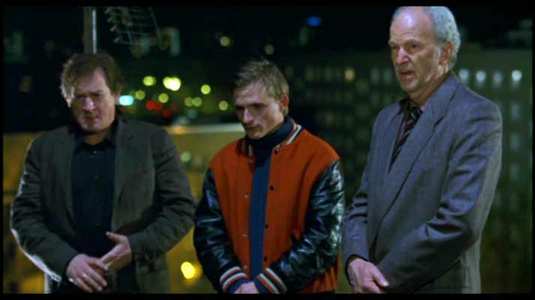
Video
A commendable, unfussy transfer. Cinematographer Martin Kukula does his best with his thankless task of blending CGI, stock footage and period set-dressing into an accessible aesthetic. The film’s lighting is perhaps cartoonish in its metaphorical implications, and he’s a bit brazen with some of Becker’s more unsubtle metaphors: during the 40th anniversary celebration, the family’s apartment is bathed in a red glow from a Party banner posted over the window. Generally however, the photography fits the directors flashy impulses.
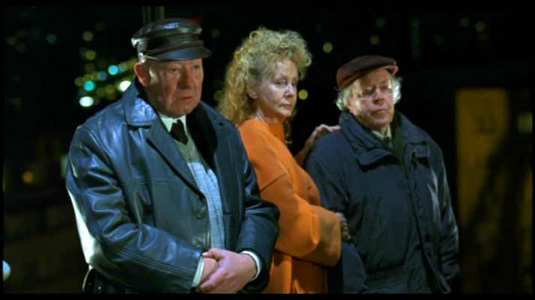
Audio
Immersive 5.1 with Yann Tiersen’s tender, romantic piano-led score capturing the bittersweet sentiments of the story. There’s a stereo track too for the less adventurous. The subtitles occasionally struggle to keep up with the more frenetic passages, and some of the humor gets lost in translation, but it’s a small price to pay for abandoning the dub.
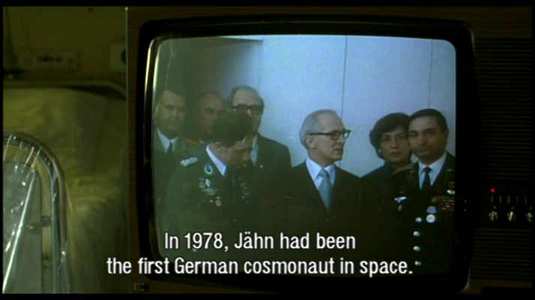
Features
A few trailers to further UGC’s distribution enterprise, and nowt else.
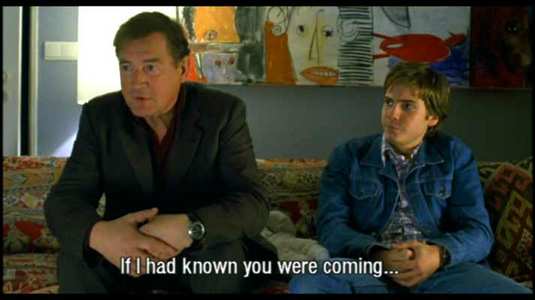
Conclusion
A superior crowd-pleaser that takes elements from euro-pop hits like ‘Amelie’ and ‘Run Lola Run’ and smooths them into a fairly slick package which manages to meet a balance between political actuality and mainstream entertainment. ‘Goodbye Lenin!’ (with or without its exclamation mark) earns points for avoiding cliches: Katrin Sass is no brittle lovelorn ice-queen but a loving and emotionally generous mother who redirects her focus from her estranged husband onto political activism. In doing so, Becker makes us empathize with her political sympathies, how they reflect intuitive drives of pragmatic compassion whilst avoiding the human perfectibility criteria that has always crippled theoretical socialism.
Its sympathies laid-bare, ‘Goodbye Lenin’ could have done with a bit more ribald communal spirit, the film’s excellent cast of supporting characters not nurtured by the mother/son focus of the screenplay. Technically, it impresses. Varied, absorbing cinematography, and superb production design by Lothar Holler. From the superb gaudy costumes (circa 1974), to the effective integration of stock footage and memorable details: a single frozen chicken, rotting and leaking blood in a state supermarket, an abandoned apartment where unopened letters clog the doorway and dead moths lie in the lamp-shades. Good too are the fleeting domestic scenes before the collapse of the wall, full of incidental detail like the permissive private/public distinction proffered by Honeker to quell rebellion.
This is a more complex film that it might initially appear, and certainly more melodramatic than its advertising dared to suggest: a son’s love for his mother is expressed through his recreation of a non-existent past, his manifestation of a perfect world in someone else’s image of happiness that, adding to the powerful sacrifice of the device, counters his own youthfully belligerent instincts. The film has a metaphorical, even Oedipal dimension – as Alex is forced to cling to the past to save his mother, East Berlin is fled to ruin by its impoverished inhabitants, high on the novelty rush of the flashier west. And what is left is a hollow consumerist echo of the past for the elderly inhabitants left in their rotting towers of asbestos and stale memories to romanticize the stability of Party rule. It’s a moving element, but Becker never quite lays his hands on it, instead, it remains distilled by Alex and his mother’s evolving/regressing emotional dynamic which constantly threatens to fall into overbearing sentiment.
The performances manage to keep this at bay however. Sass is superb and Bruhl makes for an appealing, sympathetic lead as a son who recreates the world through his mother’s rose-tinted eyes. And the film is on strongest ground when it’s exploring this familial dynamic and more awkward when indulging in anarchic pop stylization and Becker’s generally undisciplined direction. However, a lively farce emerges from Alex’s increasingly desperate attempts to maintain an Edenic Communist microcosm; with the film earning strong comedic points when humor rules over superficial turns of technique (although, that said, certain flourishes, like an elaborate ‘Clockwork Orange’ intertext, remain amusing.)
The message however, remains the draw: as youth embrace change, with all the opportunities, social mobility and unbridled hedonism afforded by the free market, the older generation are lost in the shuffle, their torpor mimicked by their now absolute redundance in the new world order. It is this, Alex’s gesture of generational exchange, that finally moves the viewer, his obsessive commitment to his mother’s socialist ideal, a hand across the divide, a transitional offering from old to new. Whether this ultimately amounts to little more than nostalgia’s ability to falsify one’s image of the past is unclear as Becker is effective in balancing the rough with the smooth – whilst the Stasi brutally suppress group demonstrations and social ambition, the sudden rush of capitalist dominance causes a palpable disconnect. If the film is painted in rather too broad humanist strokes to truly impact as a treatise (the ultimate triumph of forged ‘happiness’ over truth is too frail for that,) then its flaws seem inscrutable, as the resulting film is warm, engaging and satisfying on multiple levels.
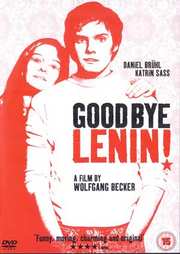













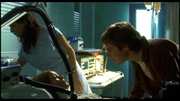

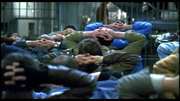



































Your Opinions and Comments
Be the first to post a comment!